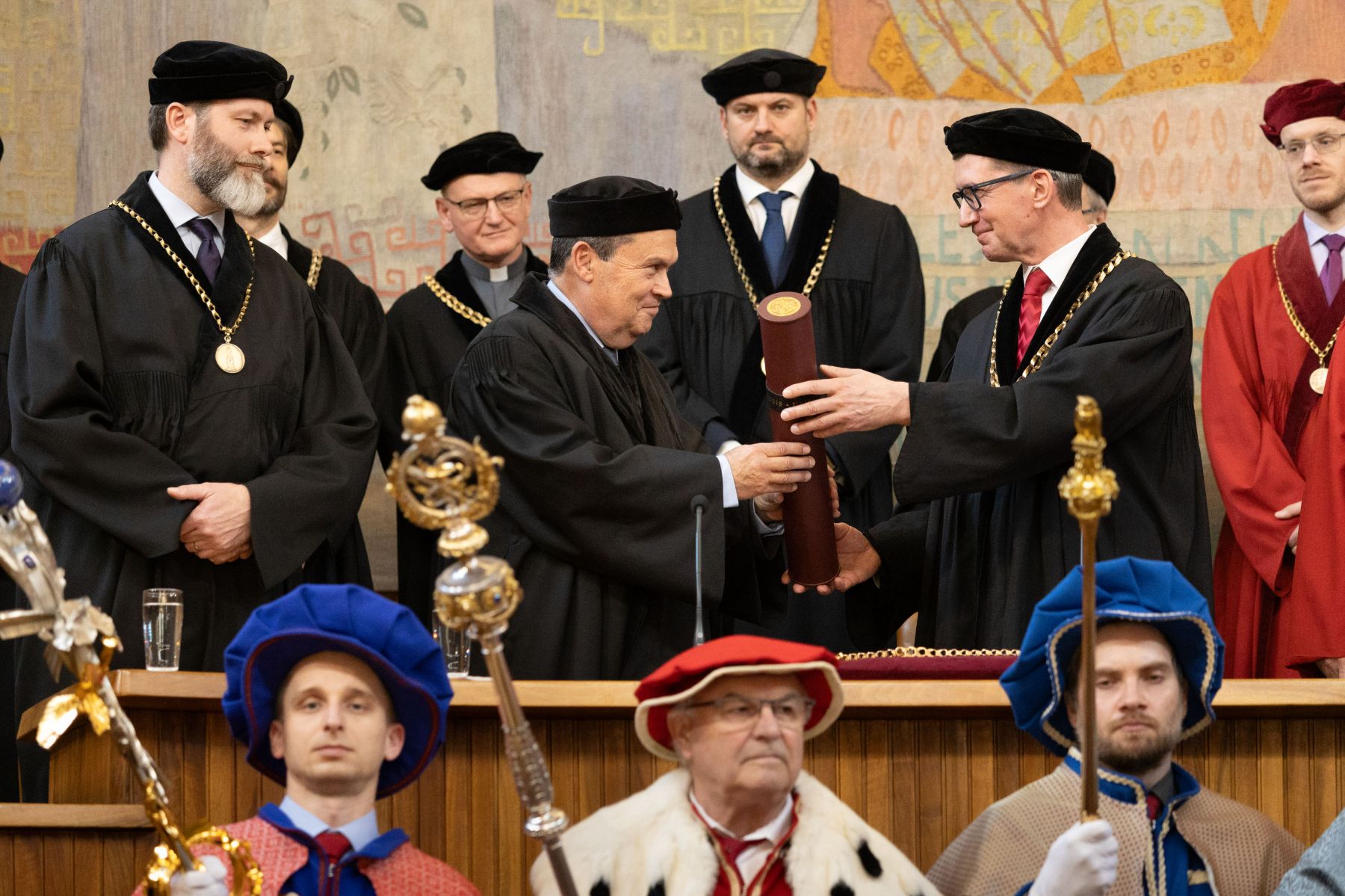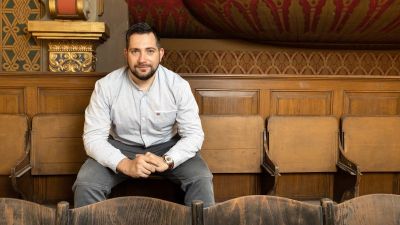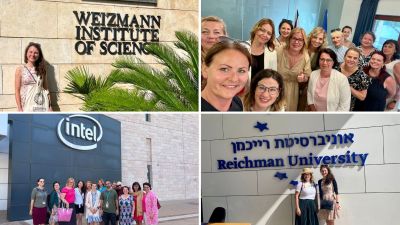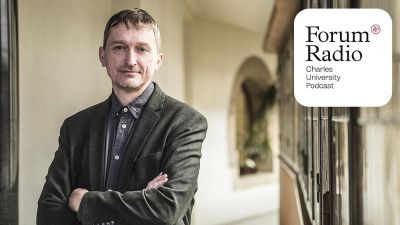Oded Lipschits, a professor of Jewish history of the biblical period, combines archaeological excavations with a modern and critical approach to the study of the Bible. "I am never happy about an individual find, no matter how beautiful or significant. For me, what is more important, and the reason I do archaeology, is the whole – the context. I'm interested in how that one find fits into the whole puzzle, how it helps us understand history in context," says the archeologist, who has long worked with Charles University and has now received an honorary doctrate from CU.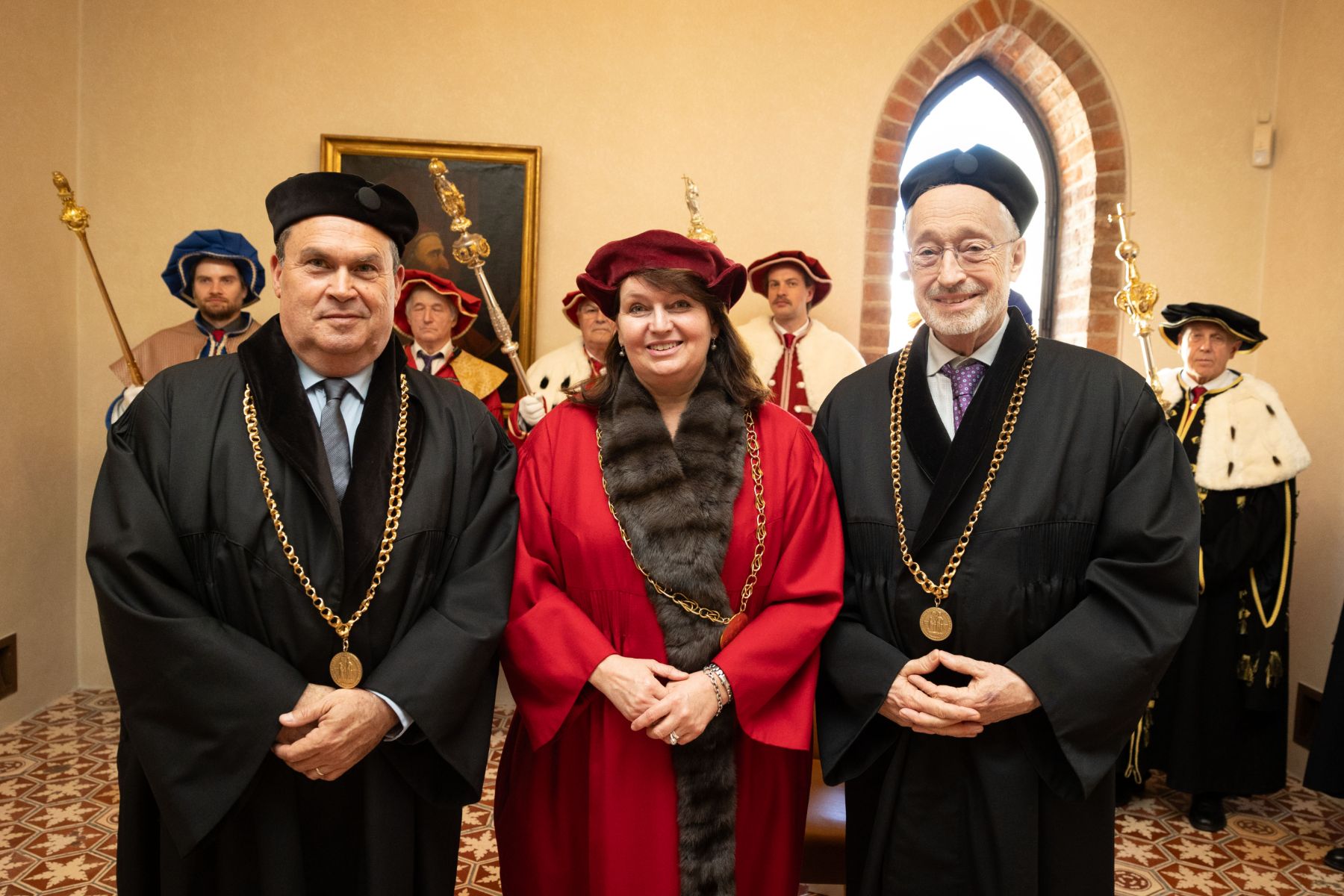
Professor Lipschits (left) received an honorary doctorate together with Professor Milgrom.
In your work you strive for a critical and modern approach to Bible study. How would you describe your research?
I personally consider myself an historian. I am interested in biblical history. I use two main sources for my research – archaeology and the Bible. I like this combination very much and it is also absolutely crucial for my work.
So for the last twenty years I have been excavating sites in Judea every summer. I always try to make as big an expedition as possible, with more than a hundred students and experts from all over the world. In my opinion, this is the only way we can get enough material to really understand what happened in the past. It's always a very big operation. A hundred people have to have something to eat, somewhere to sleep and also have good facilities to process the finds, of which we have maybe 250,000. Sometimes I call it an archaeology factory.
The second part of my research, on the other hand, is very quiet, when I try to hide in the libraries, cut myself off from the busy world and immerse myself fully in the study of the biblical texts. I am not just trying to understand or analyze the biblical text. The modern approach is to try to use the historical context and think about what the text was meant to say, why it was written the way it was written, what is intentionally missing.
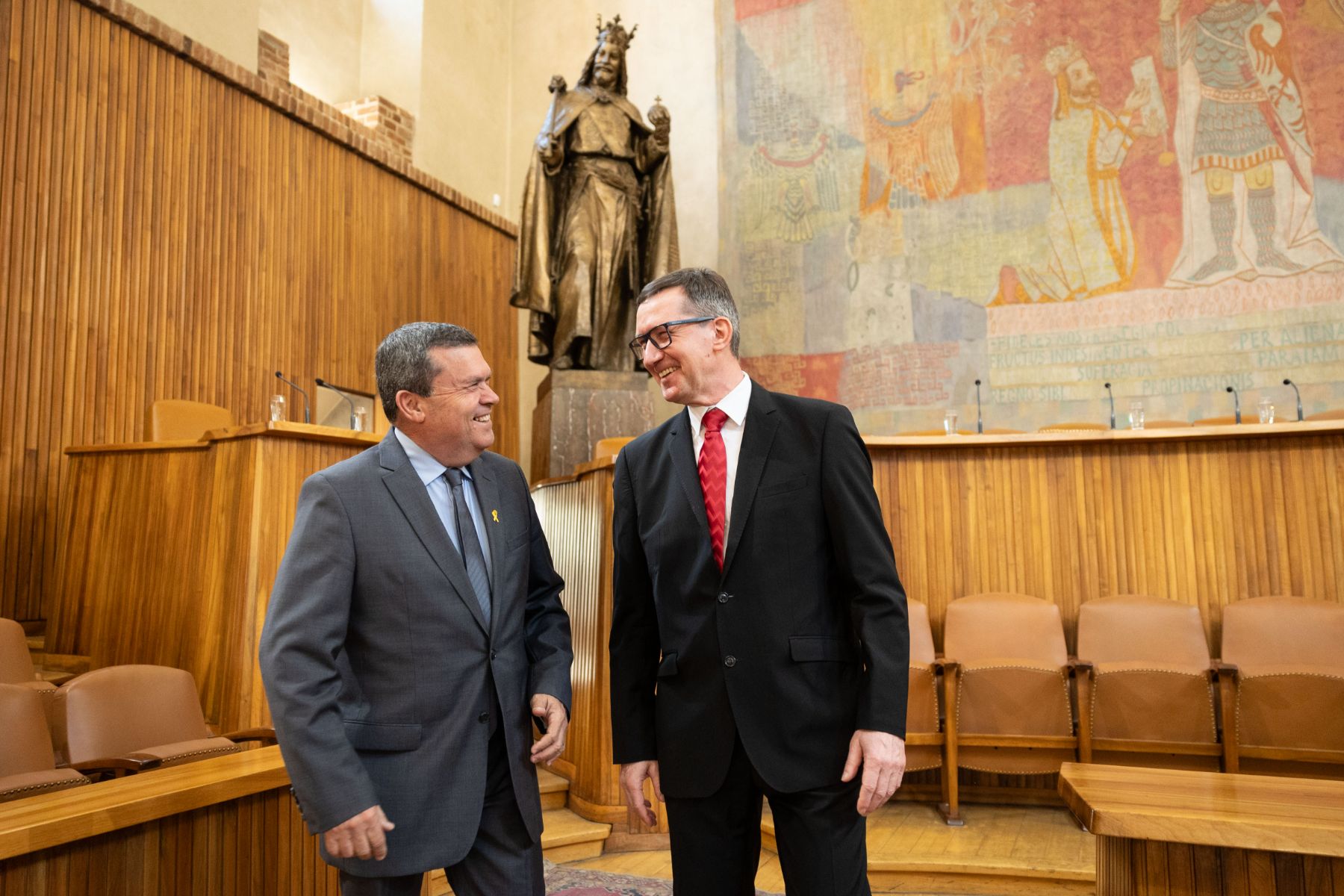
Professor Lipschits together with Professor Martin Prudký from Charles University during a tour of the Karolinum.
In 2008, when Professor Filip Čapek of the Evangelical Theological Faculty of Charles University first participated in the excavations at Ramat Rachel, your long-term and intensive cooperation with Charles University began. What makes it unique?
Since I am involved in biblical studies and the history of the biblical period, a field that not many people are involved in, I have been collaborating with European scholars from the beginning, especially in Germany, but also in other countries.
I am very happy to have such a long and intensive collaboration with colleagues from the Center for Biblical Studies here at the university. And I am always very happy when Czech colleagues participate in excavations. I think that as Czechs and Israelis we have a very similar nature. We never think about who is a professor and who is a student, but we always work together and we always work hard, and I mean physically - the field work is demanding. I'm always very pleased when I hear that Czech colleagues are coming to the dig.
Which of the discoveries so far is the most significant for you?
It may be surprising, but I am never happy about a single find, no matter how beautiful or significant. For me, what is much more important, and the reason I do archaeology, is the whole – the context. I'm interested in how that one find fits into the whole puzzle, how it helps us understand history in context.
I understand. So what is the most interesting historical "puzzle" for you so far?
It is definitely the Ramat Rachel site, on which we also worked with Czech colleagues. It is one of the most beautiful places ever built in biblical Judah, but no one has studied it properly. It was only during the excavations that we gradually understood the significance of this place. It was built at a time when Judah came under the rule of the great empires and was the center from where Judah paid taxes. And because the people of Judah were poor, so the only way they could pay taxes was with the agricultural products they had, especially olive oil and wine.
So this is where they would bring the jars of olive oil and wine to exchange for silver with which to pay their taxes. We found thousands of broken jars here from which we could understand the workings of this place. Because you don't read about this place in the Bible, even though it is only four miles from Jerusalem, where the Bible was written at that time. It's one of the good examples of how archaeology and a combination of approaches gives us the whole picture of history.
In an interview forThe Jerusalem Post, you said that the most important person in history is the historian. Isn't it frustrating that we only know the "edited" or "incomplete" history as historians wanted to record it or as we have been able to reconstruct it from archaeological excavations?
Yes, our knowledge will never be 100%, but we always try to get the most complete picture we can. In my case combining all the archaeological material, all the historical material and all the biblical stories. I always try to analyze them with as much care as I can, combine them, and get information that serves a deeper understanding. In doing so, however, we must always keep in mind our limitations, what we know and what we don't know. And always especially when you are excavating, you have to make decisions about where to dig, how much to dig, and when to stop – this is very important – maybe you can get more information, but maybe it is better to investigate other places. At the same time, the older I get the more I perceive that I will never know everything, that I can only work with what is available to me. I can describe the history of a certain period in the history of Judea, but in doing so I have to know my limits and consciously work with them.
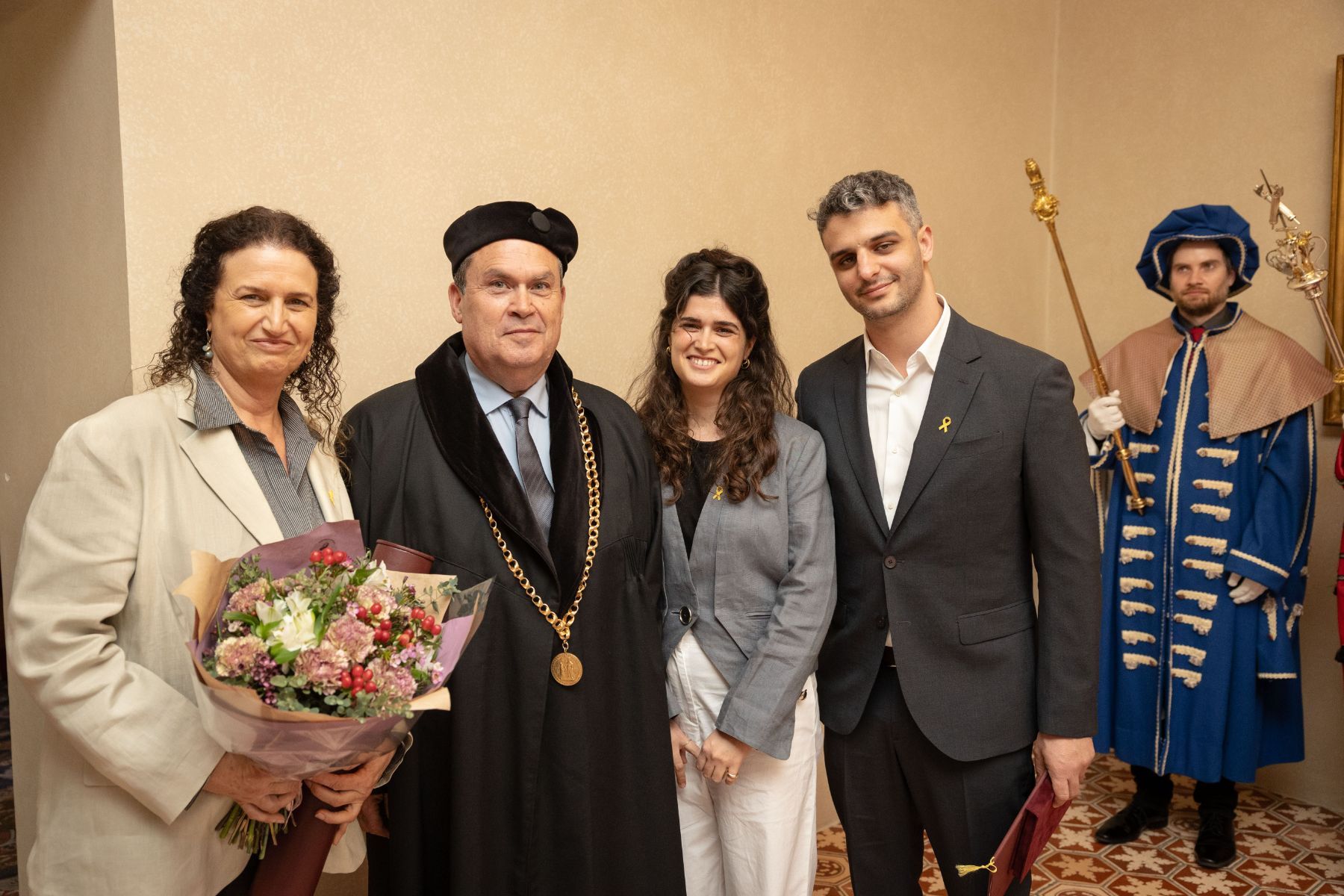
Professor Lipschits together with his family.
In addition to research, you are also active in public communication. Your podcast in Hebrew has reached more than 100,000 listeners. You have also recently released an English version of this podcast series, The Untold Story of the Kingdom of Judah. What is your motivation?
I'm also planning a book because I think there are not enough scholars in our field to bring our knowledge of the Bible, religion and theology, as well as history and archaeology, to the public. As academics, we shouldn't stay in our ivory towers and just write sophisticated articles and books that only our colleagues read. Our common past is indeed of interest to many people around the world and affects everyone.
Years ago I had an online course The Fall and Rise of Jerusalem on the Coursera platform and it was a huge success. For example, I have received many emails from churches in Europe and America that people get together on Sundays after church, watch a chapter together, and then talk about it.
I'm always trying to get people to see how we can read history in a very simple but critical way. I try to show people history in many ways. I think the popularity is helped by the topic itself - the power of the Bible, theology, and the history of the biblical period.
I think the podcast itself is a wonderful way to reach people. It's free, it's accessible, and people can listen to it while they're cooking, at the gym, or even on their way to work. The most rewarding thing for me is when people text me afterwards saying they're sitting in the parking lot listening to the last few minutes of the podcast because their commute to work is only half an hour, but they want to listen to the whole 40-minute podcast.
As you often say yourself, you have been interested in the ancient history of Israel since you were a child. Yet, if you were young again today, what would you go on to study?
Exactly the same, I wouldn't change a thing. I was really clear from a very early age. I felt only a kind of connection to this country. And I think I know why that is. You know, my father was born in 1939 in Rotterdam, Holland. When he was two years old, the Nazis invaded Holland, and his mother, the youngest of the family, sent him and his brother away to safety, because she correctly judged that it was the only chance to keep them safe. Most of the family died in Auschwitz, only my father and his brother really survived.
My father grew up in a surrogate family, he didn't remember anything. After the war, his brother found him and sent him to Israel at the age of seven, where he found a second home, although he always missed his original family. I think there's a psychological parallel there, that I'm trying to find the origins, the roots of our nation, the roots of our faith, and I find that right here and in my work.
| Professor Oded Lipschits |
| Oded Lipschits is Professor of Jewish History of the Biblical Period in the Department of Archaeology and Cultures of the Ancient Near East, Faculty of Humanities, Tel Aviv University. He was born in 1963 in Jerusalem. He studied the history of ancient Judaism and archaeology at Tel Aviv University, with which he also associated most of his academic work. From 2002–2003 he was a research fellow at the Alexander von Humboldt Foundation at the University of Heidelberg. Professor Lipschits has been and is the leader of several field archaeological research projects, primarily in the areas of Ramat Rachel, Tel Azekah, and Tel Moca, which have produced groundbreaking discoveries that expand our knowledge of the history of biblical Israel. He also actively communicates the topic of Jewish history of the biblical period to the general public through books, online courses and podcasts. |


